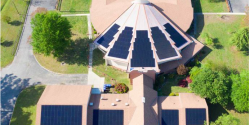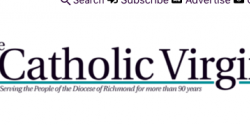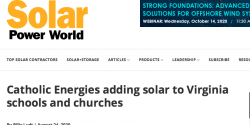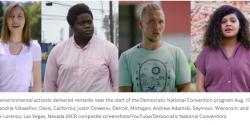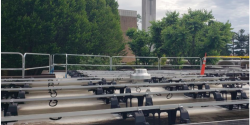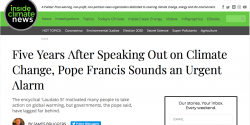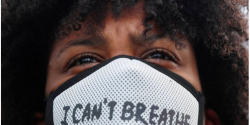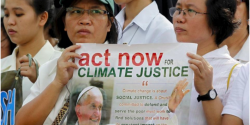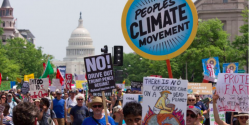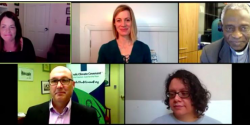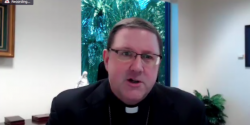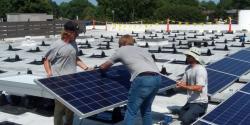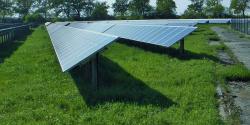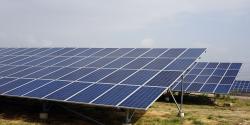For media inquiries or to request an interview with a Covenant principal, please contact elena@catholicclimatecovenant.org (202) 907-9717.

RICHMOND, Virginia — Seven Catholic entities in the Diocese of Richmond are going solar.
Inspired by Pope Francis’s 2015 encyclical, Laudato Si’, on Care for Our Common Home, parishes and schools have partnered with Catholic Energies, a program of the Washington-based Catholic Climate Covenant, to integrate solar energy and other energy-saving tools into daily operations.
Catholic Energies projects the efforts will offset more than 45,000 metric tons of greenhouse gases — about that of an average passenger car driven 100 million miles — over the next 25 years.
What is the Season of Creation?

August is almost over. September is nearly here. And for more and more Christians, that change of months also signals the arrival of the Season of Creation.
What's that, you may be asking?
Rest assured, this week's Burning Question has all the answers and background on a church season that's becoming more prominent for more Christians each year, and increasingly that includes Catholics.
Solar projects at seven Catholic entities in the Diocese of Richmond are expected to offset more than 45,000 metric tons of greenhouse gases — about that of an average passenger car driven 100 million miles — over the next 25 years.
Such are the statistics from Catholic Energies, a service of the Washington, D.C.-based nonprofit Catholic Climate Covenant which helps guide the U.S. Church’s response on climate change and care for creation.
Seven Catholic communities in the Catholic Diocese of Richmond, Virginia, have completed or nearly completed solar projects with Catholic Energies this summer, representing a substantial injection of solar power across the Diocese’s churches and schools. The combined projects will generate over 1.6 million kWh of clean electricity each year for decades and save the churches more than $2 million in energy operating costs during the term of their solar agreements.
When Michelle Obama urged Americans at the Democratic National Convention Aug. 17 to vote for Joe Biden "like our lives depend on it," her words carried special meaning among the growing number of voters concerned about climate change — a crisis they see only worsening without a change in the White House in November.
The state of the climate was spotlighted on Aug. 19, the penultimate night of the mostly virtual convention, when Democrats homed in on the convergence of climate change, jobs and justice as a key plank for voters to decide the fate of the 2020 election.
A video segment narrated by a union electrical worker compared the challenge of global warming to the moon race, and with it, the potential for creating millions of clean energy jobs. Young Americans across the country told of climate change's impact on their lives: a woman in California battling asthma and driven to activism from the devastating 2018 Camp Fire; a corn farmer in Wisconsin with lower crop yields "because of unpredictable and torrential spring rains" and environmental activists in Detroit and Las Vegas "facing the burden of pollution" and related health problems in their neighborhoods.
A quick scan of the parishes and groups partnering with Catholic Energies reveals a noticeable geographic pattern: Virginia is a growing hotbed of solar activity.
Last month, three parishes in the Arlington Diocese powered up new solar installations, each developed and financed through Catholic Energies, the burgeoning program of the Catholic Climate Covenant that helps church institutions find outside funding to take on energy initiatives without the initial burden of hefty upfront costs.
With the new installations, the parishes — St. Anthony of Padua Catholic Church in Falls Church, St. Bernadette Catholic Church in Springfield and Nativity Catholic Church in Burke — will collectively offset the carbon dioxide emissions produced by powering 3,500 homes for a year or burning 15,000 tons of coal. Just as attractive to their finance councils, the solar projects came at no cost and forecast sizeable savings.
The encyclical ‘Laudato Si’ motivated many people to take action on global warming, but governments, the pope said, have lagged far behind.
When Pope Francis issued his landmark teaching document on climate change in 2015, his words went straight to the heart of Susan Varlamoff.
Varlamoff, 70, a biologist, read Rachel Carson's Silent Spring in the 1960s and speaks proudly of a Catholic faith that embraces science and calls on church members to take care of the earth. Her sister, she said, died from cancer as a child, and she wondered whether her father's liberal use of pesticides in their suburban yard might have been the cause.
Sunny Days Power Parishes
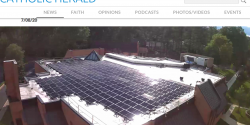
Jesus tells his disciples to proclaim his words from the housetops, said Father Robert C. Cilinski. The pastor of Church of the Nativity in Burke thinks the sun-absorbing equipment recently installed on the roof of his church is doing just that. “Our solar panels are on the rooftop shouting the wisdom of ‘Laudato Si,’ the social teaching of the church,” he said.
Across America, individuals and communities are wrestling with issues of systemic racism.
That includes the environmental movement.
In recent weeks, numerous reports have described how some of the nation's highest profile environmental organizations — the Sierra Club, National Resources Defense Council and Sunrise Movement, among them — are responding to the movement's own struggles with diversity and disconnect with communities of color, which are often most harmed by pollution and the mistreatment of the environment.
Last year at Creighton University, more than 200 people gathered for the first of a series of conferences aimed at deeper daily integration of the messages of "Laudato Si', on Care of Our Common Home." The participants arrived in Omaha from many corners of Catholic life, among them parishes, high schools, congregations of religious women, universities and the Vatican.
The killing of George Floyd has sparked a reckoning moment on race.
Around the country and the world, both people and institutions are grappling with the deadly consequences of anti-black racism. The environmental movement is no exception, and has begun confronting its own history of homogeneity, racism and xenophobia.
Participants in a May 29, 2020, Zoom dialogue about "Laudato Si After Five Years: Hearing the Cry of the Earth and the Cry of the Poor" discussed five years of Laudato Si' They are Kim Daniels of the Initiative on Catholic Social Thought and Public Life at Georgetown University; Christiana Zenner of Fordham University; Cardinal Peter Turkson, prefect of the Dicastery for Promoting Integral Human Development; Dan Misleh of Catholic Climate Covenant ; and Kim Wasserman of Little Village Environmental Justice Organization. (CNS/screen grab via Initiative on Catholic Social Thought and Public Life, Georgetown University)
The virtual meeting discussed mutual concerns about global warming, air pollution, the role they play in the rise of certain diseases and ecumenical partnership.
How does the Catholic Climate Covenant undertake sustainability projects? With Dan Misleh

Through the Noise Podcast, April 2, 2020
Catholic Climate Covenant Executive Director Dan Misleh spoke recently with Ernesto Gluscksmann at Through the Noise Podcast about how Catholic Energies projects are helping parishes around the country save money while being good stewards of the planet.
Washingtonian: Meet the Founder of the Catholic Organization Bringing Thousands of Solar Panels to DC
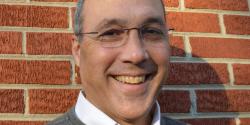
5,000, to be exact.
WRITTEN BY KALINA NEWMAN | PUBLISHED ON JULY 30, 2019
Earlier this month, Catholic Energies, along with their parent organization, Catholic Climate Covenant (CCC), announced its plans to build DC’s largest solar ground project to-date — 5,000 panels, expected to offset nearly 3,400 tons of Co2 emissions per year in the District.
At the head of it all is Dan Misleh, the founder and director of CCC. Misleh credits his project as a direct response to Laudato Si, Pope Francis’s worldwide call for climate activism. He hopes the project shows how much the Church cares about the adverse effects of climate change and, in turn, will have a positive effect on the dwindling population of young people within the faith.
National Catholic Reporter: Climate should be 'a central priority' for US church, says Bishop McElroy
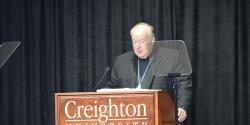
Jul 23, 2019
by Brian Roewe
OMAHA, NEB. — During an advocacy-focused breakout session at last month's "Laudato Si' and the U.S. Catholic Church" conference, a room of 30 Catholics were asked to list organizations and people within the church they perceived as engaged on the issue of climate change.
Almost every corner of the church — colleges, hospitals, women religious, Pope Francis, aid organizations, even bishops' conferences of other countries — was represented in the 20 or so groups named.
But not the U.S. bishops.
Instead, they were relegated to a second list: those with the potential to become more engaged.
In the classroom at Creighton University was San Diego Bishop Robert McElroy, who sat at a student desk and listened. For most of the three days, McElroy was a regular participant in the conference co-sponsored by Catholic Climate Covenant and Creighton. He joined small-group discussions, sat in the audience during presentations and shared meals at a campus cafeteria.
by Brian Roewe, National Catholic Reporter
There's a new energy these days at Immaculate Conception Catholic Church in Hampton, Virginia.
In mid-June, the southeastern Virginia parish flipped the switch on a 142-kilowatt solar energy system that will generate 100% of the parish's energy use from the sun.
A total of 440 solar panels now dot the roof of the church building. It is the first parish to complete a solar project with Catholic Energies, a program of the Catholic Climate Covenant aimed at helping church organizations implement solar power and energy efficiency projects at no cost to the institution.
by Brian Roewe, National Catholic Reporter
The largest ground-based solar array to date in the nation's capital is being built by the Catholic Church.
Catholic Charities of the Washington Archdiocese announced plans July 10 for a 2-megawatt solar array consisting of 5,000-plus panels that will provide enough renewable power to offset the energy needs of 12 of its buildings throughout the district.
Once constructed, it would be the largest ground-based solar project approved in the District of Columbia, project partners said in a press release.
The solar project is the most ambitious so far developed through Catholic Energies, a program of Catholic Climate Covenant to assist church institutions big and small across the country install solar panels or energy efficiency measures — all at no cost to the Catholic organizations.
Catholic Energies will manage the solar project, which will be constructed by IGS Solar and Maryland-based Solar Energy Services Inc., which will also operate the system. IGS Solar, which works in 30 states, will own the panels and also sell renewable energy certificates, which allow consumers to certify their electricity came from renewable sources.
July 21
Right now, it’s a large, empty field.
But by next year, the five-acre plot in Northeast Washington will sprout about 5,000 solar panels, the largest ground array the nation’s capital has seen — a change wrought by local Catholic groups.
Catholic Energies, a nonprofit organization that helps churches across the country switch to solar energy, partnered with the field’s owner, Catholic Charities of the Archdiocese of Washington, to build a system sufficient to keep the lights on in 260 homes for one year. The power produced will go back into the D.C. grid, earning Catholic Charities enough energy credits to offset the electricity costs of 12 of its properties across the District.

I know I've probably said this before, but I believe that Catholic Climate Covenant is doing its best work ever! With you, we have pushed backed hard against the current administration's rollbacks of basic environmental protections. Our solar installation pipeline has grown to $30 million and is helping to lower the carbon footprint of dozens of Catholic institutions. We are developing a new organizing campaign based on theCatholic Climate Declaration (many of you have already signed) to let the world know that U.S. "Catholics Are Still In" on the Paris Agreement. And this summer, we will launch a new initiative designed to weave a green thread into Catholic community life (stay tuned)! But all of this requires resources.
As 2018 comes to a close, we will be asking for your support. Our year-end-appeal simply must break all previous records. The stakes couldn't be higher! From last month's very troublesome Intergovernmental Panel on Climate Change report to the explosion of interest in our Catholic Energies program, we will need each of you to contribute something to our appeal. Even a small donation helps. If you've never given before, now is the time. If you've helped in the past, considering doubling your gift. We launch on Giving Tuesday. Can we rely on your support?
Dan
Dan Misleh
Founding Executive Director
Catholic Climate Covenant
Catholics Leading the Way
Understanding Extractive Industries and Their Impacts: Webinar Recording Available
Catholic Climate Covenant and the Inter-religious Working Group on Extractive Industries hosted a one-hour webinar exploring how a faithful and just response to climate change must also address the massive scale of extraction and exploitation of natural resources such as coal, oil and gas. Particular examples came from the Southwestern United States and Peru.
The webinar also highlighted how to avoid the damage inflicted by the fossil fuel industry, such as human rights abuses and environmental degradation, as we work to shift to a renewable energy future.
You can watch a recording of the webinar here. To learn more about faithful responses to extractive industries please check our new webpage.
Creation Care Teams Are the Church at Work
The Covenant’s Creation Care Team (CCT) program enables the Catholic community to engage parishes, schools, and religious communities at local levels. So far, over 350 teams are hard at work creating more sustainable facilities, educating on Laudato Si’ and creation care, and advocating for faith-informed climate policies. Does your community have an active Creation Care Team? Starting a new CCT or registering an existing CCT is easy!
CHECK OUT THE CREATION CARE TEAM WEBPAGE
Once registered, you will have access to a CCT Resource Library full of toolkits, a once a month email that helps guide and inform on projects and programs, and staff support to help resolve any challenges you might face.
We have prepared a one-page handout with useful information that can help you discuss the CCT program with your pastor or other interested people in your community.
Have questions about the CCT program? Contact Paz Artaza-Regan, Creation Care Teams Program Manager. She’s happy to help you get started or register an existing team.
Faithful Action on Climate Change
Register Now for the 2019 Catholic Social Ministry Gathering!
Registration now open for CSMG 2019!
Let Justice Flow (cf. Am. 5:24): A Call to Restore and Reconcile
February 2-5, 2019
Omni Shoreham Hotel, Washington, DC
Special early bird registration rate ends November 16.
Don't miss this transformative annual gathering for current and emerging leaders in Catholic social ministry and advocacy!
Connect with missionary disciples working to bring justice to their communities. Dynamic and thought-provoking plenary presentations, briefings, and workshops will awaken you to how we as a Church are called to dialogue and respond to pressing domestic and international concerns such as racism, inequality, political polarization, and difficult issues facing the Church. Then, raise your voice in advocacy with members of Congress. With Catholic Charities and Catholic Relief Services, the Covenant will be presenting a workshop on practical ways to implement Laudato Si'.
Act now to be part of our special initiatives developing diverse leaders and young leaders in Catholic social ministry.
Learn more and register for the 2019 Catholic Social Ministry Gathering!
Washington Catholic Bishops' Environmental Principles Statement
On October 4th, 2018 the US Catholic bishops in Washington State released a Catholic Principles and Environmental Policy Statement to help voters discern their position on Initiative 1631, the Clean Air Clean Energy Initiative by applying these three principles:
- All efforts to reduce the impact of climate change should respect human life and dignity, especially that of the poorest and most vulnerable among us.
- In accord with their human dignity, local communities - especially low-income residents whose voice is often not heard - should have a voice in shaping the efforts to reduce carbon emissions.
- Workers should be supported in dealing with the negative effects on the workforce resulting from a shift away from fossil fuels by receiving assistance to mitigate impacts on their livelihoods and families.
The Washington bishops also "urge every person in Washington State to seek effective ways in our personal lives, and in our businesses and industries, to promote the common good and to care for God's creation".
Catholics Respond to UN Report Climate Report
A report from the U.N. Intergovernmental Panel on Climate Change (IPCC) examining the impacts on humanity and the planet of global warming of 1.5 °C above pre-industrial levels and how policy-makers can respond was issued last month. The report states that humanity is at a "can't-fail moment" as we have less than 12 years to avoid "an ecosystem-altering climate crisis". U.S. Catholic creation care advocates responded to the report by asking the Catholic community to get serious about tackling our unsustainable lifestyles and to "see the issue of climate as part of a life-based ethic". Catholic development agencies also responded with an urgent call to action to limit global warming to below 1.5 °C by:
- Phasing out fossil fuels and switch towards renewable energy systems;
shifting to organic agriculture, redesigning agroecosystems to diversify and integrate them; changing diets, and reducing meat and dairy production and consumption; re-localizing food systems to reduce food loss and waste and build food sovereignty. - Recognizing the need to question the current framing of development and progress, which have led to the destruction of our planet wealthy nations should switch from a growth imperative to de-growth, building flourishing communities based on the principles of sufficiency.
Catholics Schools Taking Action
Catholic schools are at the forefront of creation care actions! Two wonderful examples are the composting activities at Duchesne Academy of the Sacred Heart in Omaha, Nebraska and the renewable energy swap at Saint Louis University.
Catholic High Schools can participate in the Ignatian Solidarity Network's Carbon Challenge. This year, the focus is on reducing single-use plastics and schools are asked to take three steps:
Step one: Join the December 5th, 2018 kick off day of learning, prayer, and action.
Step two: Implement an Environmental Action and Planning Week in the spring of 2019.
Step three: Implement goals to make concrete changes on your campus through advocacy focused on your school's administration.
In addition, Catholic colleges and universities can find great climate change resourcesCatholic Relief Services I Am Climate Change campaign.
The Visitor; Diocese of St. Cloud , September 17, 2018 by Catholic New Services
CRUX, September 17, 2018 by Christopher White
National Catholic Reporter, September 17, 2018 by Brian Roewe
Reposted by Catholic Philly
Reposted by Florida Catholic News





